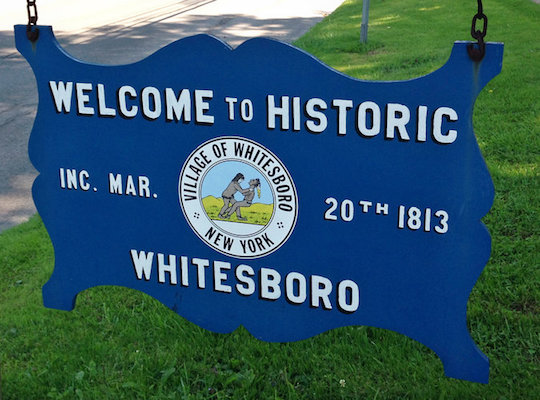Democracy does not measure what everybody wants. It measures what voters want, and convincing people to vote a certain way is not so hard as convincing them to vote at all. Yesterday, the village of Whitesboro, New York voted to keep its official seal, which depicts the village founder throwing an Indian to the ground. It was a victory for residents who knew their history. The seal does not symbolize white supremacy over Indians; it merely depicts the symbolic turning point in the village’s founding, which happened when the unfortunately named Hugh White defeated an Oneida Indian in a wrestling match. I admit it’s counterintuitive, but the Whitesboro residents who voted to keep the seal know their history—all 157 of them. The final vote was 157 to 55. That’s a turnout of 5.7% of the total Whitesboro population.
Here we encounter another instance of my unfalsifiable theory of democracy: advantage lies with anything old. The seal of Whitesboro looks ridiculous, but do you care enough to go to the nearest school, fill out a form, and vote on it? Probably not, unless you are A) concerned about representations of American Indians, B) really into history, or C) convinced political correctness has gone to far.
Of these three categories, voters in (A) are likely to be American Indians, whereas voters in (B) and (C) are likely to be old. Obviously we’re painting with a pretty broad brush here, but the 74% to 26% landslide in favor of keeping the seal suggests that this vote was something other than a measure of raw public opinion. I believe demographic forces came into play.
The conventional wisdom of American elections holds that older people vote more than any other demographic. If you believe that, it explains the tendency of our society to change first and our democracy to change later. It also raises some uncomfortable issues about how well the least-bad system of government yet discovered actually serves our needs. If a referendum on the seal of Whitesboro can make national news and then go the comically wrong direction thanks to three quarters of 5% of the people living there, maybe we should not think of such votes as strictly representative.
But what else are you gonna do? Forcing people to vote only makes the ignorant into a powerful swing bloc. Relying on the wisdom of elected leaders to make the seal look like it wasn’t drawn by David Duke’s granddaughter works in the short term, but it creates a disconnected political class over time. Submitting to hereditary rule has been proven to yield better seals, but it’s a discredited system overall. The only solution seems to be an educated, engaged electorate, but if we had one of those, we wouldn’t have to devote so much effort to governing ourselves in the first place.
I propose a new seal for Whitesboro and for democracy in general, in which a 63 year-old man wearing an American flag bandana throws to the ground everyone who couldn’t find a babysitter that day. It’ll be hard to draw, but the alternative is to remake society itself.




